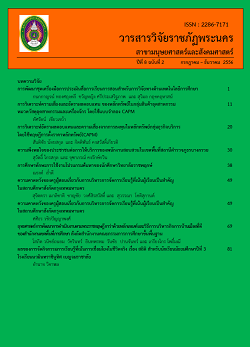ความสัมพันธ์เชิงโครงสร้างของการจัดการความรู้ต่อการประกันคุณภาพการศึกษา ของสถาบันอุดมศึกษา
Main Article Content
Abstract
ผลการวิจัยแสดงว่า ค่าเฉลี่ยตัวแปร การประกันคุณภาพการศึกษาของสถาบันอุดมศึกษา (สมศ.) และการ จัดการความรู้ อยู่ในระดับมาก มีค่าเฉลี่ยเท่ากับ 4.08 และ 3.67 ตามลาดับ ความสัมพันธ์ระหว่างตัวแปร มี ความสัมพันธ์ทางตรงเชิงบวกต่อกัน โดยพิจารณาจากค่าไค-สแควร์เท่ากับ 1.32 ที่องศาอิสระเท่ากับ 35 ค่า p เท่ากับ 0.095 ดัชนี GFI เท่ากับ .97 ดัชนี AGFI เท่ากับ .94 ดัชนี CFI เท่ากับ 1.00 ค่า SRMR เท่ากับ.018 และค่า RMSEA เท่ากับ.035 ตัวแปรทั้งหมดในโมเดล สามารถร่วมกันทานายการประกันคุณภาพการศึกษาของ สถาบันอุดมศึกษา ได้ร้อยละ 73 ซึ่งอธิบายได้ว่า การจัดการความรู้มีความสัมพันธ์ทางตรงเชิงบวกต่อการประกัน คุณภาพการศึกษาของสถาบันอุดมศึกษา ที่ค่าสัมประสิทธิ์อิทธิพลเท่ากับ .32 และส่งผลโดยรวมทางบวกที่ค่า สัมประสิทธิ์อิทธิพลเท่ากับ .85 อย่างมีนัยสาคัญทางสถิติที่ระดับ .05 ซึ่งสอดคล้องกับสมมุติฐานการวิจัย
THE STRUCTURAL RELATIONSHIP MODEL OF KNOWLEDGE MANAGEMENT EFFECTIVENESS OF QUALITY ASSURANCE FOR HIGHER EDUCATION
The main objective were of research to study of the relationship between Knowledge Management and effection to Quality Assurance. This research was quantitative research techniques on aspect of Structural Relationship Studies of several variables on the Quality Assurance of Higher Education Institutions. The sample was institutes of Higher Education that have been evaluated by the Officer of Standards and Quality Assessment ( Public Organization) in the 2nd round (in 2006-2010). Analyzed data by structural equation modeling.
The results of the study was found that average score Latent Variable factors which high level, which included; Knowledge Management and Quality Assurance for Higher Education. The average scores were 4.08 and 3.67 respectively.
The structural equation modeling, which included; Knowledge Management, and Quality Assurance for Higher Education most direct and indirect positive effects. Model validation measures repealed : = 46.36, df= 35, p-value = .095 ; Relative
= 1.32; GFI = .97; AGFI = .94; RMR = .011; SRMR= .018; RMSEA = .035; P-Value for Test of Close Fit = 0.83; NFI = .99; IFI= 1.00; CFI = 1.00; CN = 334.55. The variables in the model accounted for 73 percent of the variance of Knowledge Management and Quality Assurance for Higher Education. The describe was variables with a statistically significant direct positive effect on Knowledge Management and Quality Assurance for Higher Education (.85). Variables Knowledge Management having a statistically significant direct positive effect on Quality Assurance for Higher Education (.32). Knowledge Management interaction to Quality Assurance for Higher Education was consistent with the hypothesis of the study.
Article Details
Each publish articles were copyright by Phranakorn Rajabhat University
Any contents which appeared in each articles in the journal were authors personal opinion. It did not relate to Phranakorn Rajabhat University and other instructors in the university. Each authors would take responsibility on their articles. If there are any mistake, the authors will take responsibility themselves


